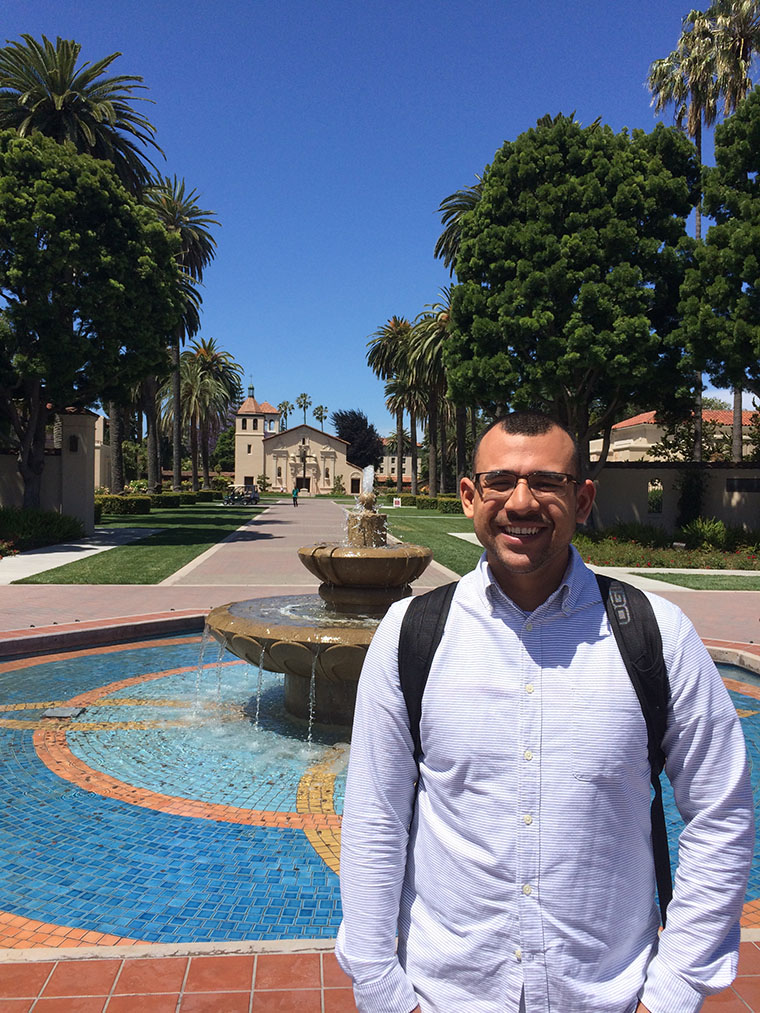Óscar Quiroz-Medrano ’17: Agent for Change

When a school bus filled with kids pulls onto campus, most people barely take note of it. But these college tours are a big deal for Óscar Quiroz-Medrano ’17 (Sociology).
In his experience, they represent a school’s belief in a student’s ability to go to the next level. And as the child of undocumented parents from Mexico who has struggled with financial challenges and learning disabilities, he saw a system that was quick to track him into a career with his hands, and not his mind.
When asked why he chose to attend Santa Clara, after being accepted to each one of the prestigious universities he applied to after completing his general education at San Jose City College, his answer was quick and clear: “I want all the little kids of color who visit this campus to see someone who looks like them going to school here so they can see it as an option for themselves. Because when I was little, I couldn’t visualize myself here.”
And Óscar certainly had opportunities to see himself at Santa Clara, since he worked in the campus neighborhood alongside his parents since the age of five. In contrast to many of his future classmates who were attending preschool at that age, Óscar was cleaning houses with his mom and landscaping yards with his dad.
The limited access he had to the resources that could propel him to success, combined with learning struggles that kept him out of mainstream classes, could have made it easy for him to succumb to the low expectations the system had for him. But instead, he took on a “challenge-accepted” mindset.
When talking with Óscar, his go-for-it attitude doesn’t come across as a loud declaration. Instead, he says with a shrug, “I had to grow up fast by translating for my parents, learning to understand the systems of a place that was foreign to them, and working alongside them since I was little. Succeeding in college is just another thing I have to do.”
His mission is to ultimately become an agent for change within the State Department of Education. This role may be a giant leap from where he is now, but Óscar has planned his way there while keeping his focus on helping people along the way.
Phase one is to take the experience he gained through an internship with Noxtin (which means “all of us” in the indigenous language Nahuatl), a juvenile justice think tank and strategic action organization, to work at Juvenile Hall. The lessons he learned became personal, because Óscar feels that he could have landed there himself if it had not been for the support of his family and community, and his drive to persevere academically.
From there, Óscar plans to obtain his teaching credential to continue being a role model for Latino youth. As someone who entered high school with a third-grade reading level and found his way to Santa Clara University, he is confident that his story of overcoming will resonate.
The turning point for Óscar was a family trip to rural Mexico when he was 16 years old. At that time, he was at the crossroads of deciding between the path of vocational school, which everyone expected him to take, or an academic one.
The extreme poverty he saw during the trip made him recognize all that he took for granted in the U.S.—things like flushing toilets, meat served with most meals, refrigerators, shoes on every child’s feet, and water that doesn’t make people sick. It was then that he understood why his parents came here… to give him a life that was by no means easy, but held opportunities for him that Mexico could not offer.
After that trip, Óscar became determined to make his parents’ sacrifice worth the cost of leaving a large family community and cultural roots behind.
In addition to the epiphanies from his travels, he credits teachers and counselors who encouraged him. He especially remembers moments like the one at Gunderson High School in San Jose when he was introduced to Machiavelli’s The Prince, which gave him his first feeling that he could truly read. He also acknowledges the tremendous support of the counselors at San Jose City College who encouraged him to keep going toward more challenging classes when they saw his early success.
Their influence – combined with opportunities he received to travel to Austria with Salzburg Global Seminar and to India with an immersion program, and many hours of community involvement and student activism – has strengthened his passion to make a difference.
Óscar is inspired to do work that means something to the next generation of students who are hungry for role models they can relate to, with each step on his path illuminating the opportunities that are available to him and to those who see him as an example.